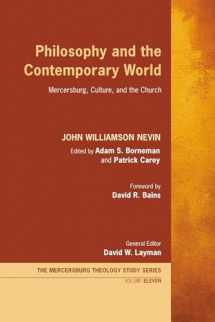
Philosophy and the Contemporary World: Mercersburg, Culture, and the Church (Mercersburg Theology Study Series)
Book details
Summary
Description
These essays by John Nevin, theologian of Mercersburg Theology, are united by two primary themes: Part 1 documents Nevin's noteworthy and innovative application of idealist philosophy to Reformed theology in antebellum America. American Christians largely rejected any inherited philosophical discipline or categories, claiming the right to invent moral and religious reality without attention to Christian tradition. The paradoxical result was authoritarian rationalism: religious doctrines imitated scientific reasoning ("common-sense" philosophy) but were imposed by ecclesiastical fiat. In contrast, Nevin summoned his fellow theologians to pay fresh attention to the Idea: the rational unpacking of transcendent truths in being, moral right, and revelation. Part 2 then documents his criticism of the predominant Christian alternatives in the mid-nineteenth century. Such alternatives were deeply flawed, Nevin thought, as they necessitated that supernatural reality be experienced through an external authority demanding assent and obedience--the pope, a body of bishops, an authoritative Bible. But for Nevin, "supernature" is Jesus Christ himself who generates and sustains the reality of which the church speaks. Thus the highest Idea was Jesus Christ, now incarnate in the history and sacramental and liturgical life of the church.


We would LOVE it if you could help us and other readers by reviewing the book
Book review



